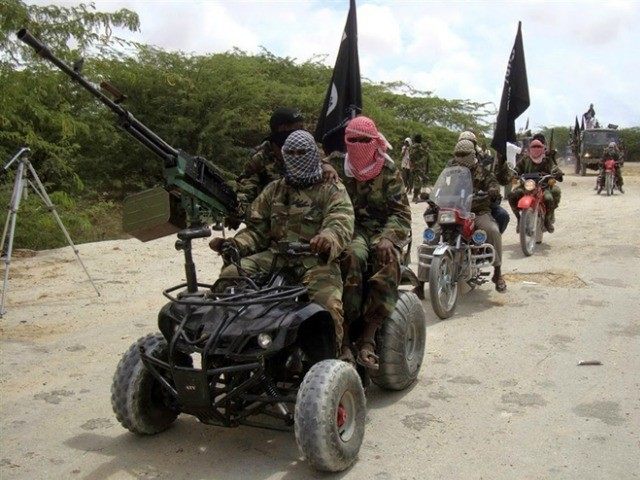The Boko Haram crisis in northern Nigeria continues to rage. On Wednesday, Boko Haram staged a major counter-attack against Cameroon– one of the nations leading an African Union coalition against the terrorist group– launching a bloody rampage through the border town of Fotokol that killed at least 91 villages and wounded over 500, according to the Associated Press.
Churches, mosques, schools, and food stores were also destroyed, in what Boko Haram described as a warning against other African nations considering a contribution to the multi-national force arranged against it. Western nations have also been contemplating more significant action against Boko Haram, a task complicated by human-rights complaints against the Nigerian army that preclude some forms of military aid.
The African Union has been trying to assemble a coordinated force of 7,500 troops from Nigeria, Cameroon, Chad, Niger, and Benin to battle what Cameroonian officials described as a “cancer” that could spread across all of Africa if not stopped. There are said to be “funding problems” hindering this effort, which, alas, has been the doom of many African initiatives. It remains to be seen if the growing threat of Boko Haram will galvanize the African Union to get past its usual bureaucratic and financial stumbling blocks, or frighten wavering members out of the coalition.
Officials from Western nations, including the U.S., France, Russia, and the European Union, attended the meetings to discuss organizing a multi-national African force, and made vague promises of assistance. There is also tension among the Western sponsors of the anti-Boko Haram coalition, however. For one thing, the French are frustrated that they have been doing much of the heavy lifting so far, flying reconnaissance missions out of their airbase in Chad and offering logistical support, including food and munitions. French President Francois Hollande was rather blunt in signaling that the rest of the West need to step up its efforts: “France can’t resolve all the conflicts in the world. Do your work. Don’t give lectures. Take action.”
That might be interpreted as a jab at the United States in particular, which has been big on lectures and #BringBackOurGirls hashtags pleading with Boko Haram to release its sex slaves, but not very aggressive about military assistance. As the Associated Press report notes, whatever military aid the Obama administration might want to provide runs afoul of the miserable human-rights record of the Nigerian army, which is bad enough to trigger American legal prohibitions against selling them the weapons they want.
There are also lingering questions about how eagerly the Nigerian government would prosecute a campaign against Boko Haram even if they had better weapons, given the less-than-stellar combat performance of their troops, and sticky political issues that make Nigeria’s southern-oriented government reluctant to incur heavy military casualties in the northern region of the country. There has been some grumbling about the need for relatively poor nations with serious military forces to do the hard fighting against Boko Haram on behalf of oil-rich Nigeria. (Chad and Cameroon claim their forces did extremely well in battle against Boko Haram over the past few days, killing hundreds of terrorist fighters with less than 20 casualties among their own forces, although those claims have not been independently confirmed.)
The United Nations is also urging stronger cooperation between Western nations and the African Union in fighting Boko Haram, commending Chad’s “swift assistance in the fight against Boko Haram in Nigeria, during which territory was recaptured from Boko Haram and more than two hundred Boko Haram terrorists were neutralized and equipment was recovered, including a dozen vehicles mounted with heavy weapons,” in a statement from the Security Council.
The U.N. also officially declared that troops from Chad and Cameroon acted on Nigerian soil with the cooperation of the Nigerian government, answering concerns raised by disgruntled Nigerian leaders that such action would violate their country’s territorial integrity, or perhaps even lead to the annexation of northern Nigerian territory by its neighbors.
The New York Times on Thursday published some harrowing accounts from Nigerian villagers of what it was like to have Boko Haram rampaging through their towns. “They started with the shootings, then came the beheadings,” said one survivor. “They said, ‘Where are the unbelievers among you?'” Women and girls, including very young children, were “parked” in houses as prisoners until they could be carted off as slaves. The instruments of conquest included mass open-air prayer sessions, conscription at gunpoint, forced marriage, starvation, and the beheading of bound captives with cries of “Allahu akbar!” That is a bit difficult to square with the Obama Administration’s official position that Boko Haram, like ISIS, has absolutely nothing whatsoever to do with Islam.
It is also clear from these reports that another favorite talking point of President Obama is false: savage though they might be, the “militants” of Boko Haram are not “nihilists” looking to burn their territory to the ground. They are trying to build a caliphate. They are taking and holding territory, building their forces through conscription and forced religious conversion, and launching strategic attacks against their enemies.
They are not going to go away – they must be defeated. If the after-action reports from Chad and Cameroon are accurate, the African Union has a fighting chance of defeating them, with proper support and coordination from Western allies. It will be difficult to finish the job without a stronger, less corrupt Nigeria… and, unfortunately, that’s a lot to ask.

COMMENTS
Please let us know if you're having issues with commenting.